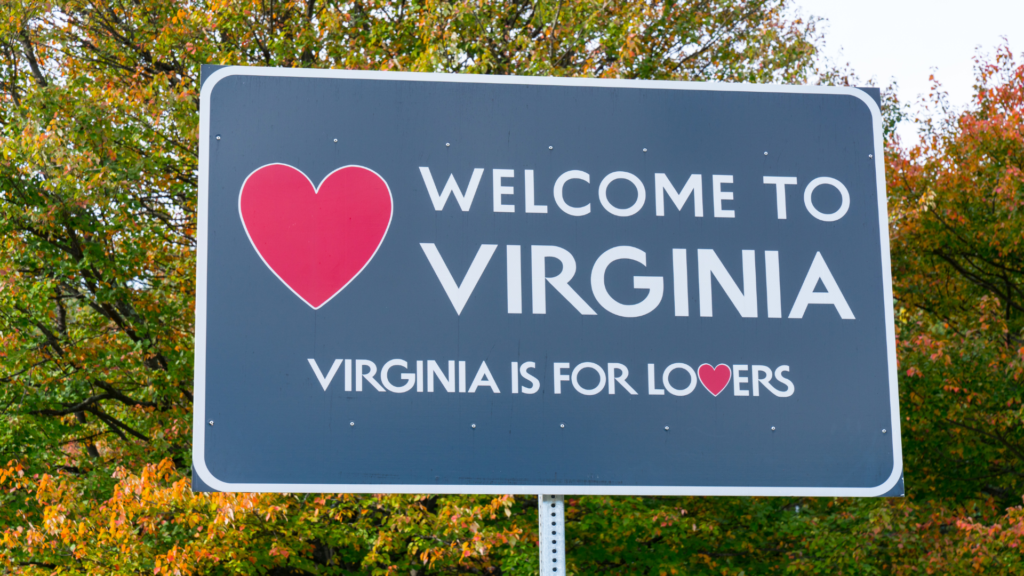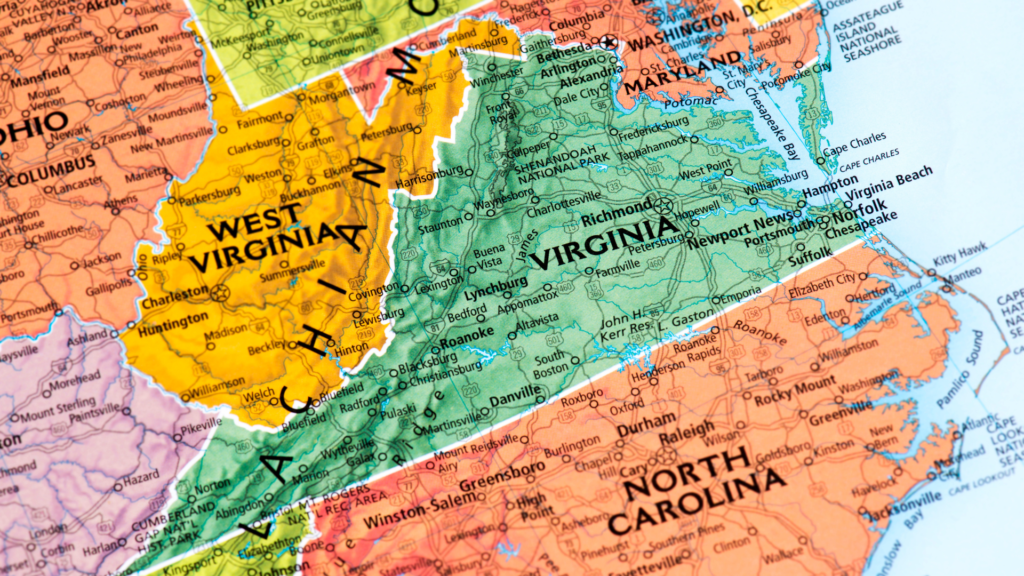
Table of Contents
Data Centers in Northern Virginia: Brightlio’s Guide to Colocation in the Mid-Atlantic
Northern Virginia is the largest data center market on earth, with over 2,500 Megawatts of total power. If you’re in the market for retail colocation services, data centers in Virginia may be on your shortlist. Virginia is known for its reliable power supply, robust network infrastructure, and favorable business environment.
Why does Virginia have so many data centers? Access to the best connectivity in the world, low cost of power, and a favorable business environment are a few key drivers.
Let’s dive in and explore the benefits of colocation in Northern Virginia!

Virginia is the Largest Colocation Market in the World
Virginia is home to more than 300 data centers. With over 2,500 MW of commissioned power and data centers that span more than 45 million square feet, the state is the largest data center market in the world. Almost 50% of the data centers in the United States are in Virginia. 90% of these data centers reside in Northern Virginia, with a smaller concentration in Richmond, Norfolk, and Boydton. In Northern Virginia, the data centers reside in Loudoun County (Ashburn, Sterling, Leesburg, and Arcola), Prince William County, Fairfax County, Fauquier County, and Culpeper County.
Loudoun is known as the “Data Center Alley” because it holds the largest concentration of data centers in Virginia. Virginia has 117 colocation sites, 31 Internet exchanges (IX), 19 disaster recovery and business continuity (DRBC) sites, and 99 cloud nodes. Popular data centers in the state include Amazon AWS (21263 Smith Switch Rd, Ashburn, VA, USA), Equinix (21691 Filigree Court, Ashburn, VA, USA), and Rackspace (44461 Chilum Place, Ashburn, VA, USA). Virginia is also a popular location for hyperscalers.
Data center pricing in Northern Virginia increased 42% year-over-year in 2023. This was the largest increase of any primary market, highlighting the region’s strong demand.
Data Centers in Northern Virginia Enjoy Robust Connectivity
Northern Virginia enjoys the best internet connectivity in the world. Virginia enjoys a robust fiber network infrastructure due to its proximity to Washington, D.C. The U.S. government began experimenting with fiber optic networking in the state during the late 1990s. The state is also home to several global fiber networks that allow data centers access low latency and high-speed internet. Let’s have a look at some of them.
- Virginia is home to the first Subsea Cable Connections in the Mid-Atlantic.
- The SAEx connects Virginia Beach to Cape Town, South Africa, via a 13,300 km cable.
- The MAREA, which Microsoft and Facebook own, operates a 200-terabit fiber optic cable. This cable runs from Virginia Beach to Bilbao, Spain.
- BRUSA is a high-capacity subsea cable that runs from Fortaleza, Brazil, to San Juan, Puerto Rico, and then to Virginia Beach. Owned and operated by Telxius, the cable provides ultrafast transmission with up to 138 Tbps.
- Dunant connects the Saint-Hilaire-de-Riez, France, to Virginia Beach. Funded by Google, the Dunant is the first private trans-Atlantic cable operated that isn’t built by a telecom company.
Virginia’s robust network infrastructure means data centers and their customers can connect with the world with the lowest latency available.

Major Cloud Providers Have Availability Zones in the State
Virginia has numerous local and global cloud providers that service the region. Amazon Web Services (AWS), Microsoft Azure, Oracle, and Google Cloud are major cloud providers with availability zones in the state. In fact, North Virginia holds over 50 AWS data centers, making it the company’s largest cloud cluster in the U.S.
Other popular cloud providers in Virginia include CodeBright, Accubits, Coshx Labs, Mobomo, and QBurst. Due to the state’s thriving cloud industry, businesses can connect directly with their preferred customers at a competitive price.
Low-Cost Energy Makes Virginia an Attractive Location
Average electricity rates in Virginia cost 14 ¢/kWh, a 38% reduction from the national average of 23 ¢/kWh. Because Virginia is home to many data centers, the state’s electricity consumption is higher than its generation. In 2020, Virginia was the 10th largest electricity consumer in the United States.
The state relies on a mix of traditional and renewable power supplies to fulfill its power requirements. Virginia has over 15 commissioned electricity power stations that support its electricity needs. Furthermore, the state government consistently advocates for clean energy sources to compensate for its intensive energy needs. Today, Virginia generates 7% of its electricity from alternative sources like solar, water, and biomass.
Virginia’s Department of Environmental Quality regularly issues permits for projects that can generate between 5 to 150 megawatts. In 2019, the state designed an energy production protocol that aims to:
- Achieve 5,500 megawatts of wind and solar energy by 2028. At least 3,000 MW should be under development by 2022.
- Generate 30% of the state’s electricity from renewable energy by the end of 2030.
- Generate 100% of Virginia’s electricity from carbon-free sources.
In 2020, Virginia replaced its voluntary renewable portfolio with the Virginia Clean Economy Act. The act requires that utility companies construct, acquire, or purchase electricity plants that can harness solar and wind energy.
Compared to other tier-1 markets like Phoenix and Dallas, Virginia is a significant player in renewable energy. Dominion Energy, one of Virginia’s largest utility companies, is constructing the largest offshore wind farm on the East Coast. This farm will have the capacity to generate up to 2,600 MW.
Because of these efforts, colocation facilities in Virginia can access cheap and consistent power supply with a lower impact on their carbon footprint.

The State Offers Many Favorable Tax Breaks
In 2010, Virginia began offering tax incentives to data centers in the Commonwealth. These facilities are exempt from paying taxes on computer equipment that meet the state’s investment and employment requirements. To qualify:
- These centers may be an enterprise or a colocation data center in Virginia.
- They must enter a Memorandum of Understanding (MOU) with the Virginia Economic Development Partnership (VEDP) to determine the specific terms of use.
- These data centers must have a $150 million new capital investment and create 50 new jobs in their locality.
- Each new job must be paid at least 150% of the prevailing annual average wage in the data center’s locality.
Virginia was also the first state to allow tenants of colocation facilities access to the sales tax exemption benefits. These tax breaks create a favorable business environment that enables businesses to reduce data center costs.
Northern Virginia Has a Favorable Business Environment
Virginia has the highest concentration of tech talent in the United States. The state has over 13,000 workers that operate in the data hosting and processing industry. This means qualified engineers are plentiful in the state.
Virginia is also home to various programs, committees, and academies that develop talents for the data center industry. We’ll explore a few here.
- The Tech Talent Invest Program: This program is a $1 billion investment in the Virginia computer education industry. It will transform the state’s tech talent pipeline over the next two decades.
- Virginia Tech’s Department of Computer Science trains students to understand the ongoing relationship between hardware and software systems.
- The Northern Virginia Technology Council’s Data Center and Cloud Infrastructure Committee: This committee promotes interest in the state’s cloud, data center, and critical infrastructure. The committee facilitates training that can help identify gaps in the industry.
- Southern Virginia Higher Education Center I.T. Academy (ITA): This academy offers short-term training that prepares individuals for a career in information technology. Students who study here also have access to a data center lab with over 200 servers, switches, and routers.
Because it is located in the Mid-Atlantic, Virginia also offers colocation facilities and proximity to economic centers within and beyond the East Coast. These include Baltimore, New York, Philadelphia, Pittsburgh, Chicago, Charlotte, and Atlanta.

Data Center Providers Brightlio Recommends in Northern Virginia
There are many colocation providers to choose from in Northern Virginia. Below are a few providers we recommend. For data center pricing for these and other option, contact Brightlio.
Equinix
Equinix operates 14 data centers in the Washington D.C. area. 12 locations are in the Ashburn area, two others in Vienna and Manassas.
Why we recommend Equinix in Northern Virginia:
- Equinix is one of the largest colocation providers globally and in the Northern Virginia market. With 14 data centers in the region, and growing, there are plenty of space, power, and connectivity options to choose from.
- Equinix DC5 at 21701 Filgree Court in Ashburn is one of the top peering exchanges in United States.
- Equinix can connect you to major cloud providers including AWS, Azure, Google, IBM, and Oracle.
Psychz Networks
We frequently recommend the Psychz Networks Ashburn facility to our clients who need partial rack colocation in Northern Virginia and other markets. They are one of the few providers that offer less than a full rack in the market.
Why we recommend Psychz in Ashburn:
- Flexible space options with full cabinet, half cabinet, and quarter cabinet footprints.
- 24×7 technical support staff and remote hands services.
- Psychz is a smaller, privately owned provider that offers high-touch customer service.
- Data center options in Los Angeles, Dallas, and Chicago make them a fit for a national colocation or disaster recovery implementation.
Evocative
Evocative’s Reston, VA data center is located at 1807 Michael Faraday Court. This carrier-neutral data center is built to Tier III standards.
Why we recommend Evocative in Reston:
- N+2 power redundancy with duel PDUs offer maximum uptime.
- Carrier neutral site with dark fiber and wave services to Equinix DC5.
- The facility meets multiple compliance certifications including SOC 2, HIPAA, PCI DSS, and ISAE 3402.

Brightlio Delivers Solutions for Colocation in Virginia
If you are in the market for data center services in Virginia or other markets, Brightlio can help. Our global network data center partners allows us to deliver competitive colocation pricing customized to meet your needs and budget. As a telecommunications broker, there is no cost to you for our services.
Brightlio offers additional I.T. services, including unified communication, network connectivity, and public cloud solutions, allowing us to deliver a complete technology solution for your business needs.
Contact the team to get started today!
If you enjoyed this article, we think you’ll like our guides to colocation in these states:
- California Data Centers: Brightlio’s Ultimate Guide to Colocation in the Golden State
- Data Centers in Connecticut: Six Reasons to Colocate in the Constitution State
- Data Centers in Florida: Colocation in the Sunshine State
- The Iowa Data Center Market: Colocation In America’s Heartland
- Data Centers in Massachusetts: Six Reasons to Colocate in the Bay State
- Data Centers in Maryland: Innovation in The Old Line State
- New Jersey Data Centers: Powering the Digital Future of the Garden State
- Data Centers in New York: The Gateway to Colocation in the Empire State
- Data Centers in Oregon: 5 Reasons to Colocate in the Pacific Northwest
- Data Centers in Texas: Colocation in the Lone Star State
- The Ohio Data Center Advantage
Recent Posts
Vancouver Data Centers: Colocation in the Pacific Northwest
Business Broadband Solutions: The Ultimate Guide
Let's start
a new project together



